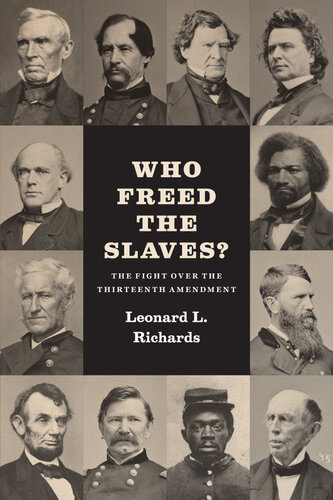
Who Freed the Slaves?
The Fight over the Thirteenth Amendment
- اطلاعات
- نقد و بررسی
- دیدگاه کاربران
نقد و بررسی

January 12, 2015
Though it’s commonly assumed that American slaves were liberated by Abraham Lincoln’s Emancipation Proclamation of January 1863, Richards (The California Gold Rush and the Coming of the Civil War) argues throughout this dense, well-researched narrative that the process was much longer and more complex, and its eventual outcome, the Thirteenth Amendment, was far from a foregone conclusion. Richards emphasizes the central role played by Ohio Congressman James Ashley, better known for his attempts to impeach President Andrew Johnson, in securing the passage of the Thirteenth Amendment. Richards is also quick to admit that many of the promises of freedom were left unfulfilled for former slaves and their descendants. The book’s length and its level of detail may discourage casual readers, and Richards’s prose style is in numerous instances overly colloquial. Moreover, the book’s many illustrations, primarily photographs and political cartoons, are not integrated into the text, so their significance and context is unclear. Nevertheless, Richards shows that even though black Americans of the time would not “experience freedom in its fullest,” the efforts of Ashley, Lincoln, and other politicians ensured that “the old assumption that every black person in America was a slave or a runaway was now history.”

May 1, 2015
Historian Richards (The California Gold Rush and the Coming of the Civil War) takes the reader behind the scenes of Washington politics to show how radical Republicans led by Ohio abolitionist and congressman James Ashley pushed for a constitutional amendment to end slavery outright. With telling detail on the dynamics and personalities making policy, he shifts the focus from Abraham Lincoln to Congress, African American soldiers, and state and local leaders who wrestled with various proposals to move against slavery, recruit African Americans into the army, consider civil rights, and remake America--or resist all such efforts. In Richards's rendering, Lincoln is less the author than the sometimes reluctant agent of emancipation, and the radicals are the tireless and resourceful heroes willing to make deals to get their way. VERDICT For those who saw the movie Lincoln, this book provides the substance of the real drama that played out over several years, culminating in the 13th Amendment, which ended legal slavery in the United States. It also provides a perceptive explanation as to how and why the promise of the 13th Amendment as an instrument for civil rights never came to fruition. In doing so, it reminds us that freedom is not a given; principled, pragmatic, and persistent advocates must work to realize and secure it.--Randall M. Miller, St. Joseph's Univ., Philadelphia
Copyright 2015 Library Journal, LLC Used with permission.




دیدگاه کاربران